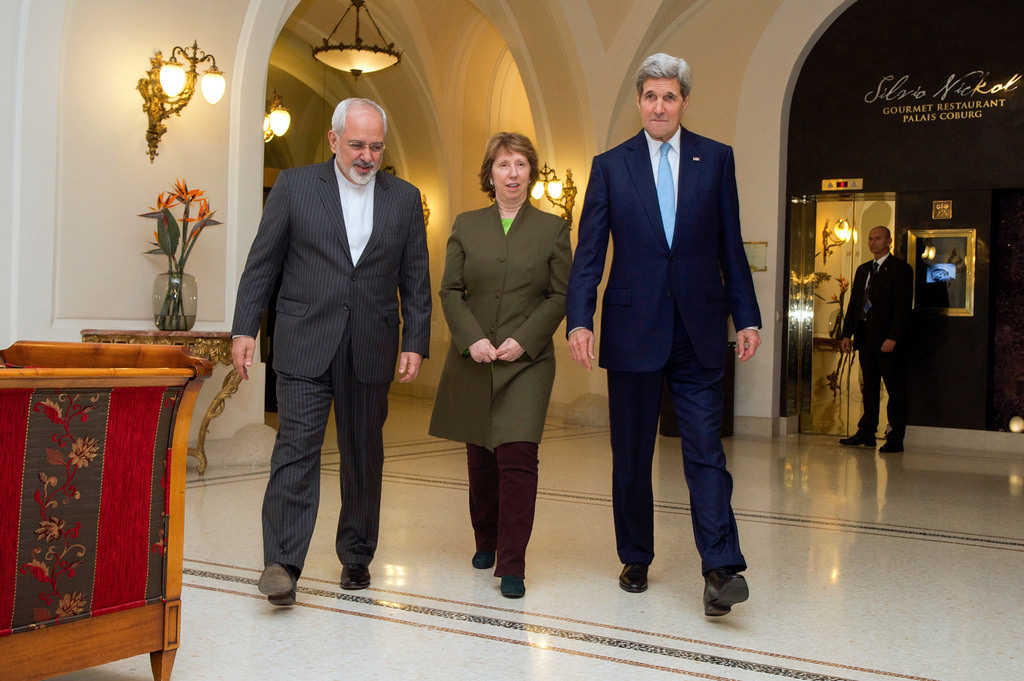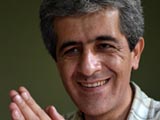The Day Everyone Was Happy
by Yaghoub Yadali translated by Parvaneh Torkamani / August 3, 2015 / No comments

U.S. Secretary of State John Kerry, Baroness Catherine Ashton of the European Union, and Foreign Minister Javad Zarif of Iran. Photo courtesy of Flickr user U.S. Embassy Vienna.
July 14 is a historic day for Iranians. The nuclear agreement between Iran and five permanent members of the United Nations Security Council, plus Germany, came to fruition and ended a 13-year-old problem. In many Iranian cities, people poured into streets happy and dancing. On the international scene, this agreement was also received very well. The heads of many countries called it a “historic” agreement which will help international peace and security.

- “Enemy…terrorism…nuclear bomb…war.” These words are often used by American media to describe Iran. The image the media presents is often hazy, incomplete, and distorted. The political and military aspects of my country are covered mainly in a negative light.
- In Under Eastern Eyes (I have adopted the name from the novel Under Western Eyes by Joseph Conrad), I will write about those topics which American media either cannot or does not want to talk about. The emphasis will be on social and cultural aspects of Iran although, out of necessity, I will talk about politics, despite my despair.

- Yaghoub Yadali, born in 1970, is a writer and television director. His first work of fiction, the short-story collection Sketches in the Garden, was published in 1997. It was followed in 2001 by Probability of Merriment and Mooning, which was named book of the year by the Writers and Critics Award. His first novel, The Rituals of Restlessness, won the 2004 Golshiri Foundation Award for the best novel of the year and was named as one of the ten best novels of the decade by the Press Critics Award. He has also published many articles and reviews of literature and cinema in newspapers and magazines in Iran.
Negotiations for this agreement took 13 years, and in the last round many diplomatic records were broken. In the last round, the U.S. Secretary of State, John Kerry, stayed in Vienna for fourteen days and talked for hours with secretaries of state from other countries. This is the longest any top American official has stayed in one place in order to negotiate a specific file. Also, the number of hours that Kerry and Javad Zarif, the Iranian Secretary of State, spent meeting and talking about the Iranian nuclear file is rare in the history of international diplomacy.
On the other hand, until two years ago, no one thought that the secretaries of state of the United States or Iran would even pass by each other! Let alone shake each other’s hands, walk together in the streets of Geneva, and sit across each other for hours. In fact, these developments came to be once Barack Obama was elected in the United States, and Hassan Rouhani in Iran.
In the past eighteen years, realistic and moderate governments had never existed in both countries simultaneously. When the reformist government of Mohammad Khatami came to power in Iran, Bill Clinton gave his seat to George Bush, who called Iran an “axis of evil,” and often, with a harsh tone, spoke of military action against Iran. Next, when Democrats came to power, the hardliner government of Mahmoud Ahmadinejad was in power. In this way, the possibility of talk and rational agreement between the two parties was not possible until Rouhani reached power in Iran. When he came to the United Nations, he spoke with President Obama via telephone. These two were the first presidents of the two countries who, after three decades of cut relationships, agreed to talk to each other. A talk that only took fifteen minutes. This fifteen minute conversation was the beginning of later developments in the relationship between the two countries and opened the ground for nuclear talks.
Now there are hot debates in Iran about the future of the relationship between Iran and America. Will the parties be ready to talk and cooperate about their common and favorite issues, like the handling of the terrorist group ISIS or local problems such as those concerning Syria and Yemen? Many Iranians are waiting hopefully for further developments between the two countries so they could use opportunities in both countries and communicate normally like citizens of other countries. It is not a big wish that tourists, professors, writers, and artists of the two countries could travel safely to the other country and not worry about its consequences. Or that entrepreneurs in both countries could sell their products to each other, and the Iranian Secretary of State would not have to worry that if he walked in Vienna with John Kerry, he would be criticized by hardliners in Iran.
It seems like there is a long road before the many hurdles between the countries are removed. But the hopeful point is that, until two years ago, no one thought the two countries could solve one of the most important problems between them, or that the meeting of the heads of state of the two countries would not be taboo. Who knows, maybe in a few years we will read in newspaper headlines that the President of the United States had dinner in Tehran with the President of Iran.




